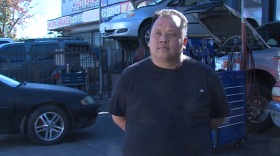Democrats are debating what they really want when it comes to health care — or more precisely, they're debating what they can get.
President Obama said again over the weekend that he supports a government-run health insurance program. It is what the administration calls a public option, some extra competition for insurance companies.
But that option has drawn more criticism than any other part of the plan. When a Cabinet secretary said the public option was not essential, the headline was that it could be dropped. The president's challenge now: to satisfy both liberals and conservatives in his own party.
And while the Obama administration may be willing to listen to different ideas about competing with private health insurance, but plenty of other Democrats are not.
Rep. Keith Ellison, a liberal Democrat from Minnesota, is one of them. "Let me just tell you, I would love to see single-payer health care," he says. "But, you know, I view - my support of a public option is a compromise, and I've compromised as much as I'm going to."
Ellison is a member of both the Progressive Caucus and the Congressional Black Caucus. Both have consistently opposed efforts to drop the public option, which would create a government insurance plan to compete with private insurers. It could use the purchasing power of its customers to leverage lower prices and serve as a fallback option for those who have no others.
Some Democrats may be feeling the heat from town hall opponents of government health insurance, but Ellison says they risk another backlash from their liberal base if they drop the public option.
"I think it's very important to understand that the majority wants the public option," Ellison says. "And these squeaky wheels, you know, if you give them the oil because they're loud now, there will be an even larger price to pay down the line."
Howard Dean, the former Democratic Party chair and unofficial voice of the liberal wing, says there simply is no reform without the public option.
"I think it's not just politically bad, because there'll be no enthusiasm among the activist wing, but it's — policy wise, it's a bad policy," Dean says.
What bothers Dean and his allies is the Obama administration's sudden willingness to consider a partial measure that supporters of the public option dislike: health care cooperatives.
The idea floating around the Senate is that the government would provide seed money for private but nonprofit, consumer-owned cooperatives that would compete in the health care insurance market, much as credit unions compete with banks. Dean says co-ops just aren't enough.
"It's not reform," Dean says. "We've already tried that, and it's failed. That's a political compromise. If you're going to have to compromise, you need to keep the core policy intact, which is that we really want to reform the system. If you can't get the votes for a public option, then don't call it health reform."
Senator Kent Conrad, a Democrat from North Dakota, is part of a bipartisan group in the Senate Finance Committee that's trying to negotiate on a health care bill. Conrad says a co-op system would be far less expensive than the health care proposal in the House.
"I've got to live in the world where votes are actually cast that are going to determine whether there is change or no change," Conrad says. "No change is not an option."
He adds: "Those of us who actually have to count votes know that public option does not have the votes. If we're going to continue to ride that horse, we're going to ride that horse off into the sunset. Not much is going to happen."
But Conrad's plan has yet to win over many senators.
"The more I learn about it, it is a very, very dicey way to take on gigantic insurance companies," says Sen. John Rockefeller, a West Virginia Democrat.
He points to a recent Government Accountability Office study on co-ops that found them more efficient, but not so great at lowering premiums.
Since the mid-to-early '90s, several cooperatives have shut down or seen the number of participating insurers and employers dwindle. Rockefeller spoke to NPR about health insurance co-ops last month.
"First of all," he said, "it's never been national, so I'd have to, I guess, be pretty convinced that you could start and make from scratch a co-op which does not exist in most of the territories of the United States, and that they could suddenly make a national one and make it work. And we would bet the farm on that. I'm not willing to do that."
At this point, it's not clear anyone is willing to bet the farm on any of the several approaches to revising the system.
The House is still expected to vote for a plan that includes the government insurance option. The Senate is not.
At some point in the fall, the White House will be asked to negotiate between them. And whichever approach the White House prefers, its top priority is getting a bill to the president's desk.
Copyright 2022 NPR. To see more, visit https://www.npr.org. 9(MDAzMjM2NDYzMDEyMzc1Njk5NjAxNzY3OQ001))






